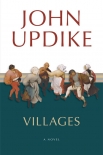Villages, John Updike [brene brown rising strong .TXT] 📗

- Author: John Updike
Book online «Villages, John Updike [brene brown rising strong .TXT] 📗». Author John Updike
Owen, like his neighbors, likes Haskells Crossing the way it is. Self-governed Haven-by-the-Sea, with its town meetings and hotly debated tax overrides, seems a village too pleased with itself, too busily inturned. The distant Cabot City officialdom leaves him, save financially, untouched. Water, rusty but drinkable, pushes up his hill from a city reservoir; trash is collected at the foot of his driveway once a week. A policeman, the one time he and Julia reported a robbery, appeared the same day, looking baffled but sympathetic, with glistening oval eyes. He looked like a big squirrel without a bushy tail, hunched over his notebook nearsightedly nibbling at every acorn of a clue. The thief was never found.
Owen, raised in a village idyllically becalmed by hard times, in a nation steadfastly abjuring the quick fixes of fascism and communism, holds a mixed bag of socio-economic attitudes: he votes Democrat, because his parents and grandparents had voted for Roosevelt, but at the same time he expects so little from government that all social services and signs of public order pleasantly surprise him. When Bradley Acheson bemoans to him, on the broad sunlit lawn of the day’s cocktail party, the latest attempt to subdivide and develop the old Judson estate’s sixty-five acres, Owen’s tongue is tied, undecided between agreeing, for the sake of the green spaces that old wealth once kept open and that only government intervention can sustain, and pointing out that the North American continent’s history has been one of development. “Housing starts,” he finally, haltingly says, “are a leading economic indicator, and isn’t crying ‘Nimby’ somewhat anti-democratic, even anti-patriotic under your great guy Bush Two?”
“Nimby?”
“Not in My Back Yard.”
Brad has evidently not heard the acronym before, and his bark of laughter hurls a bit of devilled egg at the lapel of Owen’s blazer. Owen doesn’t flinch, and courteously waits while his host’s large, square face—itself a space that invites development—chews through the uncongenial complexity, the sterile conflictedness, of his guest’s reply. “The developer,” Brad complains, “isn’t even from Massachusetts—it’s some California megafirm that comes in and knocks down every tree and puts up this horrendous spread of McMansions, jammed in as tight as the zoning allows. We’ll wind up looking like Watertown.”
“Sounds horrible, Brad, but, hey, it creates jobs, jobs in one of the few American industries they can’t take overseas. Listen: every town in this country was once a farm or a forest. If you right-wing tree-huggers had been in charge, nothing would ever have been built. Cabot City would still be a river full of fish. Haven-by-the-Sea would be Nothing-by-the-Sea. It would be a heap of clamshells beside some rotting wigwams.”
Brad presses his lips together and looks as if he might sputter; he squints over Owen’s shoulder to see what other of his guests need attending, what pleasanter conversations he might join. “There has to be a balance,” he finally decides.
“Exactly,” Owen agrees. He loves Brad, as a golfer. When he looks at him he sees not his soul, as God is said to, nor the statistics of his income and net worth, as the tax authorities hope to discern, but a certain swing, a kind of twirling motion with the fingers held too near the end of the grip, a dainty yet determined swing which, on good days, delivers drives down the middle, sometimes sneaky long, and tosses up chips that creep marvellously close to the hole. The men of Owen’s acquaintance in Haskells Crossing and its environs are to him an array of golf swings, no two alike: staid Morton Burnham a powerful but too-upright lunge with an ineradicable head-bob; loose-jointed Geoffrey Dillingham an exaggerated shoulder-turn, the club flung back way past parallel; stout Quentin Chute a trigger-quick hand-punch, all forearms and grimace; fussy Martin Scofield an agitated, overintellectual set-up, the feet shuffling to widen and narrow, close and open the stance while the club is insecurely gripped and regripped, a mis-hit increasingly certain; serious-minded Gavin Rust a rather comical last-second squat, after a series of solemn waggles with locked knees; careful Caleb Eppes a superslow take-back, like the Tin Man after a night of rain; excitable Corey Cogswell an incorrigible look-up and a subsequent hail of curses upon himself, with an aborted club-toss; and so on. Owen’s male friends are ninety percent swings to him; he knows almost nothing of their professional activities, or the religious convictions that frame their sense of well-being, or the erotic adventures that have brought them to their present domestic situations. Most, in fact, are still married to the girls they had married in the ’fifties. Most have a sinusoid New England accent and the playful regional reticence, perfected through generations of close dealing, as New England’s proportional share of the national wealth dwindled. Owen’s ignorance of these natives, however, is partly willful; their seeming blankness is something within him, a lockout of input. He is not interested in them because, as Julia has pointed out, he does not covet their wives. Their wives are twittering biddies, haggard rasping former debutantes, perky, mannerly, and as finely fitted to this society as the parts of a well-milled machine. In Middle Falls, on the outer rim of a greater metropolitan area, none of the women had quite fit; all





Comments (0)